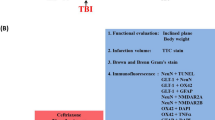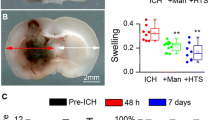Summary
The effect of anti-inflammatory treatment on monocyte/macrophage infiltration, major histocompatibility complex molecules (MHC) class II expression and delayed oedema following experimental brain contusion was studied by immunohistochemistry and tissue-specific gravity measurement in 44 rats. Colchicine, chloroquine and dexamethasone administered once daily for five days after the trauma reduced inflammation and oedema. The difference was statistically significant with colchicine and dexamethasone.
The findings comprise further evidence of a pathogenetically important inflammation after experimental contusion. It is probable that anti-inflammatory agents may prevent secondary neurological damage due to elevated intracranial pressure and cell to cell- or cytokine-mediated neuronal degeneration and demyelination.
Similar content being viewed by others
References
Anderson DK, Means ED (1985) Iron-induced lipid peroxidation in spinal cord: protection with mannitol and methylprednisolone. J Free Radie Biol Med 1: 59–64
Barclay AN (1990) The localisation of populations of lymphocytes defined by monoclonal antibodies in rat lymphoid tissues. Immunology 42: 593–600
Bauer J, Berkenbosch F, Van Dam AM, Dijkstra CD (1993) Demonstration of interleukin-1 beta in Lewis rat brain during experimental allergic encephalomyelitis by immunocytochemistry at the light and ultrastructural level. J Neuroimmunol 48: 13–21
Blight AR (1985) Delayed demyelination and macrophage invasion: a candidate for secondary cell damage in spinal cord injury. Cent Nerv Syst Trauma 2: 299–315
Blight AR (1992) Macrophages and inflammatory damage in spinal cord injury. J Neurotrauma 9: 83–91
Braakman R, Scheuten HJ, Blaauw-van Dishoeck M, Minderhoud JM (1983) Megadose steroids in severe head injury. Results of a prospective double-blind clinical trial. J Neurosurg 58: 326–330
Bullock R, Statham P, Patterson J, Wyper D, Hadley D, Teasdale E (1990) The time course of vasogenic oedema after focal human head injury — evidence from SPECT mapping of blood brain barrier defects. Acta Neurochir (Wien) [Suppl] 51: 286–288
Bullock R, Teasdale GM, Wyper D (1989) Tomographie mapping of CBF, CBV and BBB changes after focal head injury using SPECT: mechanisms for late deterioration. In: Hoff J (ed) Proc VIIth Int Symposium Intracranial Pressure and Brain Injury. Springer, Berlin Heidelberg New York, pp 637–639
Damoiseaux JG, Dopp EA, Beelen RH, Dijkstra CD (1989) Rat bone marrow and monocyte cultures: influence of culture time and lymphokines on the expression of macrophage differentiation antigens. J Leukoc Biol 46: 246–253
Dearden NM, Gibson JS, McDowall DG, Gibson RM, Cameron MM (1986) Effect of high-dose dexamethasone on outcome from severe head injury. J Neurosurg 64: 81–88
Dijkstra CD, Dopp EA, Joling P, Kraal G (1985) The heterogeneity of mononuclear phagocytes in lymphoid organs: distinct macrophage subpopulations in the rat recognized by monoclonal antibodies EDI, ED2, and ED3. Immunology 54: 589–599
Du Plessis JJ (1992) High-dose dexamethasone therapy in head injury: a patient group that may benefit from therapy. Br J Neurosurg 6: 145–147
Dusart I, Schwab ME (1994) Secondary cell death and the inflammatory reaction after dorsal hemisection of the rat spinal cord. Eur J Neurosci 6: 712–724
Feeney DM, Boyeson MG, Linn RT, Murray HM, Dail WG (1981) Responses to cortical injury: I. Methodology and local effects of contusions in the rat. Brain Res 211: 67–77
Giannotta SL, Weiss MH, Apuzzo ML, Martin E (1984) High dose glucocorticoids in the management of severe head injury. Neurosurgery 15: 497–501
Giulian D, Chen J, Ingeman JE, George JK, Noponen M (1989) The role of mononuclear phagocytes in wound healing after traumatic injury to adult mammalian brain. J Neurosci 9: 4416–4429
Giulian D, Corpuz M, Chapman S, Mansouri M, Robertson C (1993) Reactive mononuclear phagocytes release neurotoxins after ischemie and traumatic injury to the central nervous system. J Neurosci Res 36: 681–693
Giulian D, Robertson C (1990) Inhibition of mononuclear phagocytes reduces ischemie injury in the spinal cord. Ann Neurol 27: 33–42
Gobiet W, Bock W, Liesegang J (1976) Treatment of acute cerebral edema with high dose of dexamethasone. In: Becks JWF, Bosch DA, Brock M (eds) Intracranial pressure III. Springer, Berlin Heidelberg New York, pp 231–235
Gordon CR, Merchant RS, Marmarou A, Rice CD, Marsh JT, Young HF (1990) Effect of murine recombinant interleukin-1 on brain oedema in the rat. Acta Neurochir (Wien) [Suppl] 51: 268–270
Hall ED (1985) High-dose glucocorticoid treatment improves neurological recovery in head-injured mice. J Neurosurg 62: 882–887
Hall ED, McCall JM, Chase RL, Yonkers PA, Braughler JM (1987) A nonglucocorticoid steroid analog of methylprednisolone duplicates its high-dose pharmacology in models of central nervous system trauma and neuronal membrane damage. J Pharmacol Exp Ther 242: 137–142
Holmin S, Mathiesen T (1995) Biphasic edema development after experimental brain contusion in rat. Neurosci Lett 194: 97–100
Holmin S, Mathiesen T, Shetye J, Biberfeld P (1995) Intracerebral inflammatory response to experimental brain contusion. Acta Neurochir (Wien) 132: 110–119
Kobrine AI, Kempe LG (1973) Studies in head injury. II. Effect of dexamethasone on traumatic brain swelling. Surg Neurol 1: 38–42
Lampson LA (1987) Molecular bases of the immune response to neural antigens. Trends Neurosci 10: 211–216
Marmarou A, Poll W, Shulman K, Bhagavan H (1978) A simple gravimetric technique for measurement of cerebral edema. J Neurosurg 49: 530–537
Marmarou A, Tanaka K, Shulman K (1982) An improved gravimetric measure of cerebral edema. J Neurosurg 56: 246–253
Malinesen T, Kakarieka A, Edner G (1995) Traumatic intracerebral lesions without extracerebral haematoma in 218 patients. Acta Neurochir (Wien) 137: 155–163
McLaurin RL, Helmer F (1965) The syndrome of temporallobe contusion. J Neurosurg Vol 296–304
McMaster WR, Williams A (1979) Identification of Ia glycoproteins in rat thymus and purification from rat spleen. Eur J Immunol 9: 426–433
Nelson SR, Mantz ML, Maxwell JA (1971) Use of specific gravity in the measurement of cerebral edema. J Appl Physiol 30: 268–271
Polman CH, Dijkstra CD, Sminia T, Koetsier JC (1986) Immunohistological analysis of macrophages in the central nervous system of Lewis rats with acute experimental allergic encephalomyelitis. J Neuroimmunol 11: 215–222
Quagliarello VJ, Wispelwey B, Long WJ, Jr, Scheid WM (1991) Recombinant human interleukin-1 induces meningitis and blood-brain barrier injury in the rat. Characterization and comparison with tumor necrosis factor. J Clin Invest 87: 1360–1366
Shohami E, Novikov M, Bass R, Yamin A, Gallily R (1994) Closed head injury triggers early production of TNF alpha and IL-6 by brain tissue. J Cereb Blood Flow Metab 14: 615–619
Sminia T, de Groot CJ, Dijkstra CD, Koetsier JC, Polman CH (1987) Macrophages in the central nervous system of the rat. Immunobiology 174: 43–50
Statham PF, Johnston RA, Macpherson P (1989) Delayed deterioration in patients with traumatic frontal contusions. J Neurol Neurosurg Psychiatry 52: 351–354
Stein SC, Spettell C, Young G, Ross SE (1993) Delayed and progressive brain injury in closed-head trauma: radiological demonstration. Neurosurgery 32: 25–30; Discussion 30–31
Todd NV, Graham DI (1990) Blood-brain barrier damage in traumatic brain contusions. Acta Neurochir (Wien) [Suppl] 51: 296–299
Unterberg A, Kiening K, Schmiedek P, Lanksch W (1993) Long-term observations of intracranial pressure after severe head injury. The phenomenon of secondary rise of intracranial pressure. Neurosurgery 32: 17–23; Discussion 23–24
Wekerle H, Linington C, Lassman H, Meyermann R (1986) Cellular immune reactivity within the CNS. Trends Neurosci 9: 271–277
Woodroofe MN, Cuzner ML (1993) Cytokine mRNA expression in inflammatory multiple sclerosis lesions: detection by non-radioactive in situ hybridization. Cytokine 5: 583–588
Author information
Authors and Affiliations
Rights and permissions
About this article
Cite this article
Holmin, S., Mathiesen, T. Dexamethasone and colchicine reduce inflammation and delayed oedema following experimental brain contusion. Acta neurochir 138, 418–424 (1996). https://doi.org/10.1007/BF01420304
Issue Date:
DOI: https://doi.org/10.1007/BF01420304




